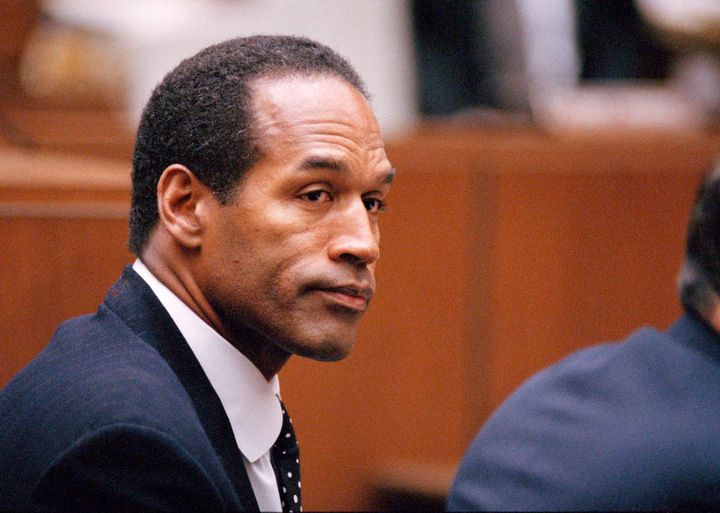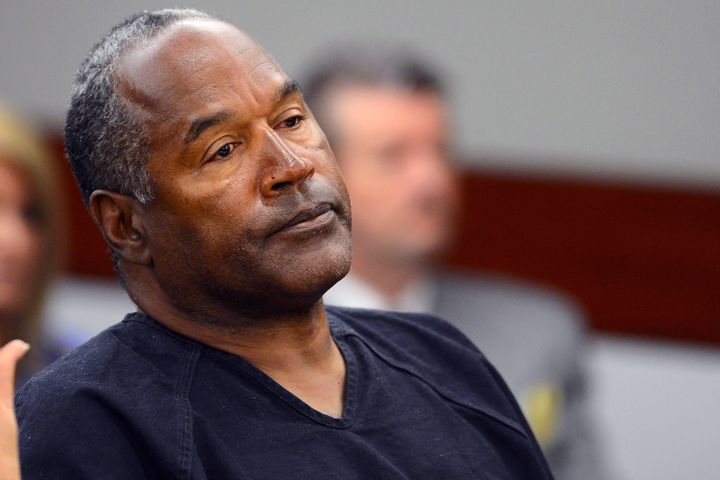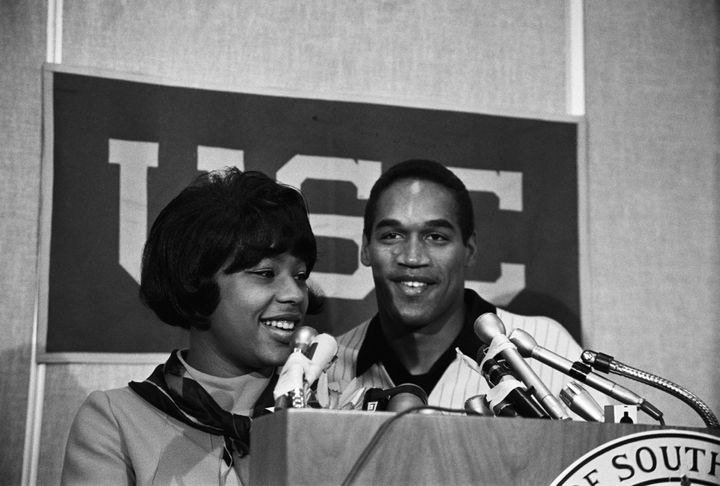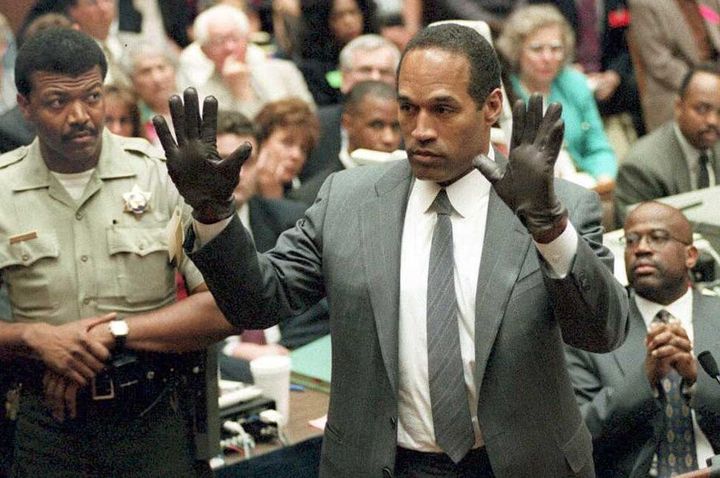
Football Hall of Famer O.J. Simpson, whose 1995 double-murder trial gripped and divided the nation, died Wednesday from cancer, his family announced on his social media page. He was 76.
“On April 10th, our father, Orenthal James Simpson, succumbed to his battle with cancer,” a post on X, formerly Twitter, stated. “He was surrounded by his children and grandchildren. During this time of transition, his family asks that you please respect their wishes for privacy and grace.”
Orenthal James Simpson, nicknamed “Juice” for his initials, was considered one of the best running backs to ever play the game. But he is likely to be most remembered for what was known as “The Trial of the Century,” in which a Los Angeles jury found Simpson not guilty of killing his ex-wife and her friend.

Simpson was born and raised in San Francisco. His father, Jimmy Simpson, abandoned the family when Simpson was 4 years old, and he was raised by his mother, Eunice Simpson. According to Jeffrey Toobin’s book, “The Run of His Life: The People v. O.J. Simpson,” Jimmy Simpson later came out as gay and ultimately died of complications from AIDS in the mid-1980s.
In a 1977 interview, Simpson spoke of the effect his parents’ separation had on his life.
“I resented his absence, especially when I became a teenager and was trying to find out who I was,” he told Parents magazine at the time, according to The New York Times. “I really needed a man around then for guidance. I get along with my father now, but it’s taken years for me to come to terms with my feelings.”
As a young teenager, Simpson ran with a street gang called the Persian Warriors and was briefly incarcerated at a juvenile detention facility.
“I was always the leader ― the baddest cat there,” Simpson told the Times in 1975. “You had to be.”
Simpson’s football career started at Galileo High School, where he played fullback. He credited his athletic success in part to an interaction with Major League Baseball star Willie Mays.
As the Times reported in 1994:
He was 13 when his idol, Willie Mays, appeared one day at his door. A youth counselor had appealed for help with a spectacular young athlete headed for trouble. The star center fielder for the San Francisco Giants spent the afternoon with O.J., even taking him to his huge house in a wealthy section of the city.
“I had an entirely different outlook on everything after that day with Willie Mays,” Mr. Simpson later recalled. “The day with Mays made me realize that my dream was possible.”
Simpson went on to star on the University of Southern California football team as a running back. In 1968, he won the Heisman Trophy after running for 1,709 yards and 22 touchdowns. The following year, he was selected as the No. 1 overall NFL draft pick by the Buffalo Bills, where in 1973 he became the first player in league history to rush for more than 2,000 yards in a single season.
Simpson retired from football in 1979 after a stint with the San Francisco 49ers. He was inducted into the College Football Hall of Fame in 1983 and the Pro Football Hall of Fame in 1985.
Simpson married for the first time in 1967, at age 19, to his high school sweetheart, Marguerite Whitley. The couple had three children together, the youngest of whom drowned in a swimming pool at 23 months of age. In 1977, while still married to Whitley, Simpson met and began dating Nicole Brown. Simpson and Whitley separated in 1978; he married Brown in 1985. The couple had two children before Brown filed for divorce in 1992.

After leaving pro football, Simpson worked as an actor, producer and sports analyst. But it all came to a screeching halt in 1994, when Simpson’s ex-wife, Nicole Brown Simpson, and her friend, Ron Goldman, were found stabbed to death outside Brown Simpson’s condominium in the Brentwood neighborhood of Los Angeles. Days after their deaths, Simpson was arrested after leading police on a chase in his white Ford Bronco that was broadcast live.
The trial generated a media frenzy that engrossed the American public and highlighted the country’s racial divisions. The year of the murders, a Washington Post-ABC poll showed that 63% of white people believed Simpson was guilty of the killings, compared with 22% of Black people. By 1997, that divide had grown to 83% and 31%. Simpson’s defense team argued that their client had been framed by racist Los Angeles Police Department officers.
The trial concluded on Oct. 3, 1995, when a jury acquitted Simpson of both murder charges. In his closing statement, Simpson said he “did not, could not and would not have committed this crime.”
Although Simpson seemed bothered by the idea of being associated with Black America — “My biggest accomplishment,” he once told the Times, “is that people look at me like a man first, not a Black man” — he was a symbol both of Black success and of racial polarization in America.
In 1997, less than two years after he was found not guilty of Brown Simpson’s and Goldman’s murders, a civil jury found Simpson liable for their deaths. He was ordered to pay $33.5 million in damages to the victims’ families, though Kim Goldman, Ron Goldman’s sister, told the Los Angeles Times in 2019 that her family had received less than 1% of what they were owed, despite a relentless effort to secure more.

In 2007, Simpson found himself once again in legal trouble. In November of that year, he was part of an armed raid on a Las Vegas casino hotel room to retrieve valuable sports memorabilia. Simpson was eventually convicted of multiple felonies, including kidnapping and armed robbery, and sentenced to nine to 33 years in prison at Nevada’s Lovelock Correctional Center. He was released in October 2017 after serving nine years, and he spent his remaining years in Las Vegas.
Simpson’s life and his murder trial became the subjects of two 2016 series: “O.J.: Made in America,” an Academy Award-winning five-part ESPN documentary, and FX’s critically acclaimed miniseries “The People v. O.J. Simpson: American Crime Story.”
Simpson maintained his innocence in the killings until the end.
“We don’t need to go back and relive the worst day of our lives,” he told The Associated Press in 2019. “The subject of the moment is the subject I will never revisit again. My family and I have moved on to what we call the ‘no negative zone.’ We focus on the positives.”
Simpson is survived by four children. His two children with Brown Simpson — daughter Sydney and son Justin — were asleep inside the condo during their mother’s murder, but as adults they have largely remained silent about the killing. Simpson’s mother, who testified on his behalf during the murder trial, died in 2001.
Disclaimer: The copyright of this article belongs to the original author. Reposting this article is solely for the purpose of information dissemination and does not constitute any investment advice. If there is any infringement, please contact us immediately. We will make corrections or deletions as necessary. Thank you.
